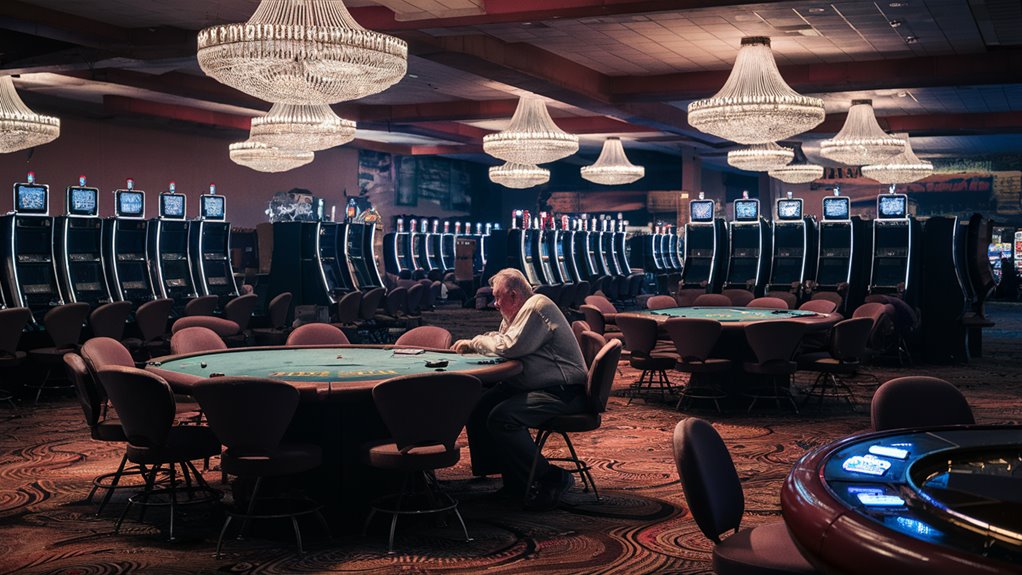Have you noticed how the bright lights of traditional casinos don’t shine quite as brightly these days? Well, there’s a good reason for that. The gambling world is going through some pretty big changes, and those fancy resort-style casinos aren’t exactly the main attraction anymore.
Sure, places like Vegas and Macau still pull in the crowds, but let’s be real – the future of gambling looks quite different. You know how younger people these days want everything at their fingertips? They’re not too keen on planning elaborate casino trips when they can get their gaming fix right from their phones or computers.
Think about it this way. If you could play your favorite poker game while sitting on your couch in your pajamas, would you really want to drive hours to a casino, deal with parking, and navigate through crowds? Probably not. That’s exactly what’s happening across the industry.
The tech revolution isn’t just changing how we place bets, it’s completely transforming the whole experience. Virtual reality poker rooms let you feel like you’re at a high-stakes table without leaving home. Blockchain technology is making betting more secure and transparent than ever before. It’s pretty wild when you think about it.
But here’s the thing – traditional casinos aren’t just competing with convenience. They’re up against a whole new generation that values sustainability and digital innovation. Those massive, energy-hungry casino buildings? Not exactly aligned with modern environmental concerns.
So while the neon signs might still be flickering in gambling capitals around the world, the real action is increasingly happening in the digital space. The future of gambling isn’t about where you go anymore – it’s about how easily you can play, wherever you happen to be.
The Rise of Mobile Gaming
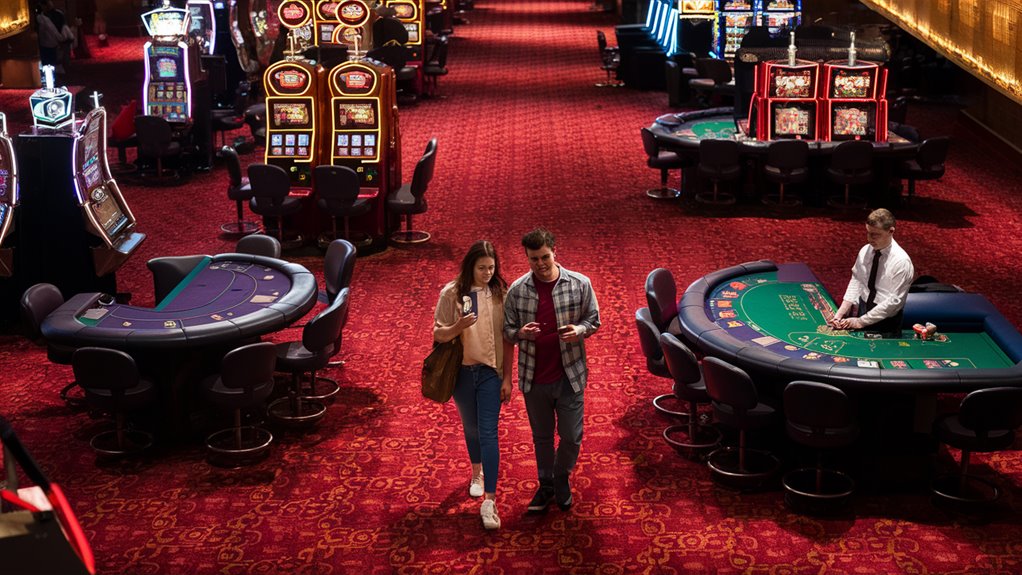
Let’s talk about how mobile gaming has completely changed the way we think about gambling these days. You know how we used to have to plan an entire trip just to visit a casino? Well, those days are pretty much over.
Now, anyone with a smartphone basically has a casino right in their pocket – pretty wild when you think about it.
The really interesting part is how these mobile platforms have transformed the whole gaming experience. Picture this: you’re sitting on your couch in your pajamas, playing poker with a real dealer through your phone screen, or competing against friends from across the country in your favorite slot game.
It’s like having Vegas at your fingertips, but without the expensive buffets and long walks through crowded casinos.
These gaming apps really know how to keep us coming back too. They’ve got all sorts of personalized perks and rewards that traditional casinos just can’t match.
And the variety? It’s honestly mind-boggling. You can switch from blackjack to 먹튀검증 토토사이트 baccarat to video slots in seconds, something that would take you ages walking around a regular casino floor.
The numbers really tell the whole story here. Mobile gambling now makes up more than half of all online betting revenue, which is pretty incredible when you think about it.
And with internet speeds getting faster and graphics becoming more impressive by the day, this trend isn’t slowing down anytime soon. Traditional casinos might need to step up their game if they want to keep up with what’s happening in our pockets.
Millennial Gamblers Prefer Digital Experiences

Let’s talk about how millennials are reshaping the gambling world. You know how this generation grew up with smartphones in their hands?
Well, it shows in their gambling preferences. They’re not too keen on the bright lights and buzzing atmosphere of traditional casinos – instead, they’re all about those sleek digital platforms they can access with just a few taps.
Think about it: when was the last time you saw a twenty-something getting excited about pulling a slot machine lever? These days, they’re more likely to be huddled around their phones, playing games that actually require some strategy and skill.
It makes sense, right? After all, this is the generation that grew up competing in online games and connecting with friends through social media.
The numbers really tell the story here. Millennials spend about a third more time gambling on apps compared to physical casinos, and they’re way more likely to place bets through their phones than walk up to a casino counter.
But it’s not just about convenience – these digital platforms have gotten pretty clever about what makes millennials tick. They’ve added things like live dealer games where you can chat with other players, achievement systems that make you feel like you’re leveling up in a video game, and social features that let you share your wins with friends.
It’s kind of fascinating how the whole industry has had to adapt, isn’t it? Traditional casinos are scratching their heads while online platforms are basically creating a whole new world of gambling that feels more like playing a mobile game with friends than sitting alone at a blackjack table.
And you can bet this trend isn’t slowing down anytime soon.
Costly Overhead Hurts Traditional Casinos
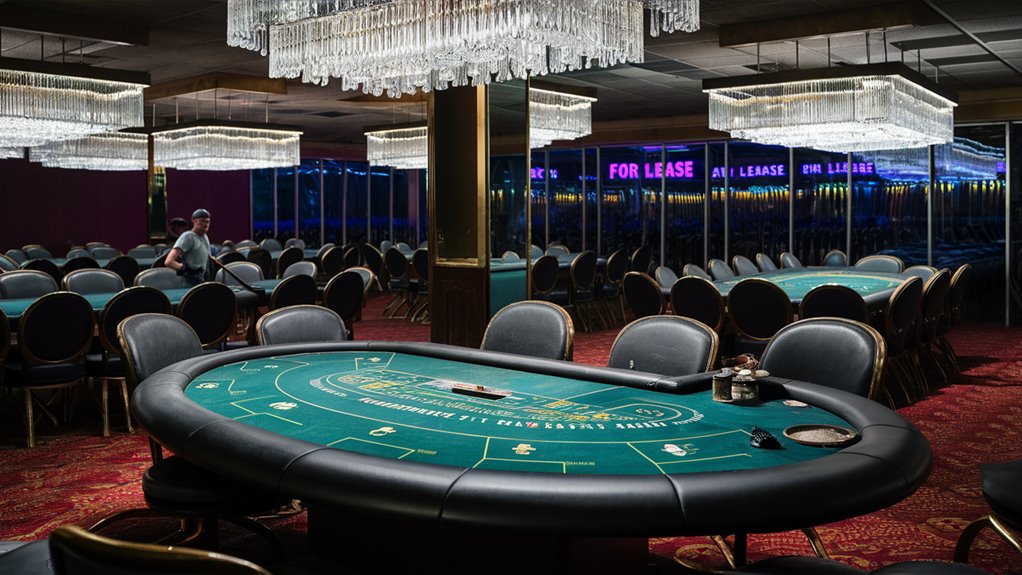
Let’s talk about why traditional casinos are feeling the squeeze these days. You know how running any business comes with expenses, right?
Well, imagine keeping the lights on and the AC humming in a massive building 24/7 – that’s just the start of what these gaming establishments deal with.
Think about walking into a typical casino. Those dazzling lights, comfortable temperatures, and endless rows of slot machines don’t come cheap.
The utility bills alone would make your jaw drop. And that’s before we even get to the really expensive stuff, like insurance costs and property taxes that keep piling up year after year.
What really sets traditional casinos apart from their online rivals is the sheer number of people they need to keep things running smoothly.
While an online casino might get by with a tech team and some customer service reps, physical venues need actual human dealers, security guards walking the floor, cleaning crews working around the clock, and entire kitchen staffs feeding hungry gamblers.
Each of these employees needs benefits, training, and insurance – costs that digital platforms simply don’t have to worry about.
The trickiest part? Traditional casinos can’t just press pause when business slows down.
Unlike online platforms that can scale operations up or down with a few clicks, brick-and-mortar establishments are stuck with their massive buildings and all the associated costs.
Picture running a restaurant that can never close, even during slow seasons – that’s what these casinos face every day.
They need a steady stream of visitors just to keep the lights on, literally and figuratively.
Remote Gambling During Global Crisis
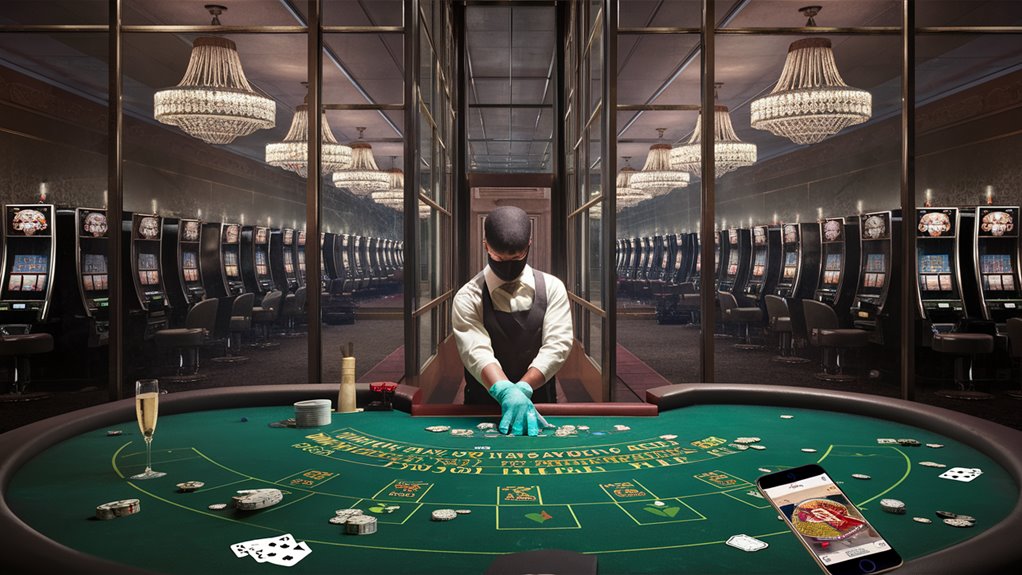
The world of gambling changed dramatically when we all found ourselves stuck at home during recent lockdowns. You know how it goes – when traditional casinos closed their doors, millions of people discovered they could still get their gaming fix through online platforms.
Let’s face it, while you couldn’t pull that familiar slot machine handle or feel the texture of poker chips, virtual alternatives were just a click away.
Think about it. Who’d have guessed that playing from your couch in pajamas would become the new normal? Online platforms quickly showed us just how convenient they could be.
No more planning weekend trips, booking hotels, or waiting around for a seat at the blackjack table. Whether it’s a quick game during lunch break or a late-night poker 도박중독 방지 팁 session, virtual casinos are always open for business.
The numbers really tell an interesting story here. Online gambling saw massive growth, with revenues jumping by more than 200% in many regions during lockdowns.
But here’s the surprising part: even after restrictions lifted, people stuck with their screens. It makes sense when you think about it. Once you’ve experienced the ease of playing whenever and wherever you want, it’s pretty hard to justify the hassle of driving to a physical casino.
This shift isn’t just a temporary trend, it’s reshaping how we think about gambling altogether. Sure, traditional casinos still have their charm, but for many players, the convenience of online platforms has become too good to pass up.
After all, why dress up and drive across town when you can enjoy your favorite games right from home?
Social Gaming Communities Gain Momentum
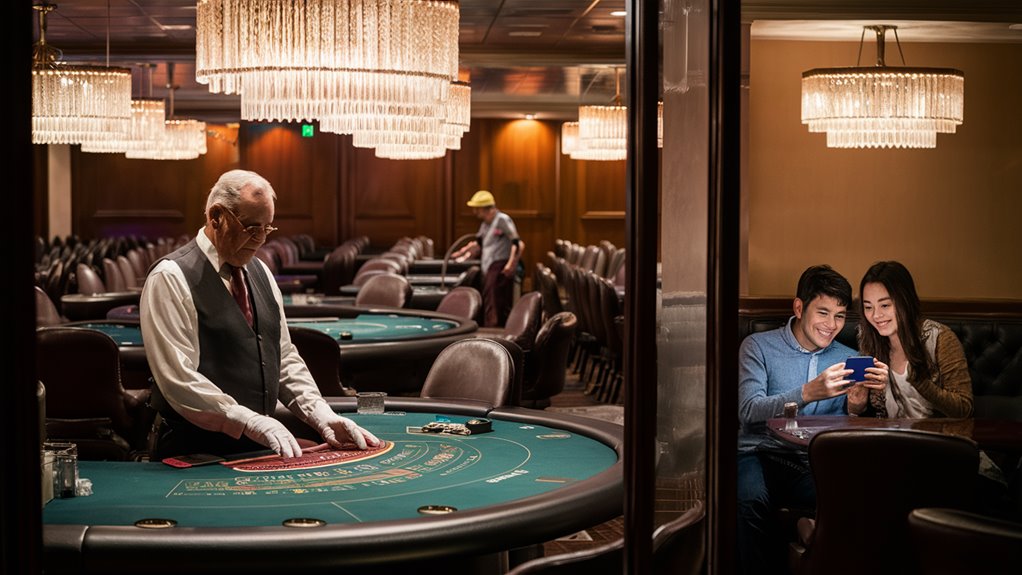
You know how gaming has changed lately? While traditional casinos took a hit during lockdowns, online gaming communities really came into their own.
It’s fascinating to see how players found new ways to connect through virtual poker rooms, slot tournaments, and table games. Picture this: you’re sitting at home, chatting with fellow players through messaging or voice chat, while your animated avatar shows off your latest custom outfit.
But these aren’t just your typical casino games recreated online. We’re talking about something completely different here.
Think daily tournaments where you can team up with players from Tokyo to Toronto, join specialized gaming clubs, and even compete in global leagues. The best part? Many platforms let you play with virtual currency, so you can enjoy all the excitement without touching your wallet.
What really catches my attention is how these spaces have grown beyond just gaming. Hop into any platform and you’ll find yourself in a buzzing social hub.
There are strategy forums where players swap tips, live streaming channels showcasing expert gameplay, and virtual meetups that feel just like hanging out with friends at a local game night.
And let’s not forget about mobile gaming. Whether you’re on your lunch break or relaxing at home, you can jump into a quick poker game or try your luck at the slots while chatting with players from around the world.
It’s pretty amazing how technology has made it possible to carry these gaming communities right in your pocket.
Cryptocurrency Reshapes Betting Landscape

The world of betting has taken an interesting turn with the rise of cryptocurrencies. You know how frustrating it can be to wait days for your winnings or deal with endless paperwork at traditional casinos? Well, digital currencies are changing all that.
Imagine being able to place bets and collect your winnings almost instantly, just like sending a text message to a friend.
Let’s break it down. Bitcoin, Ethereum, and other cryptocurrencies have basically created a new way to handle your gambling funds.
Think of it as having a digital wallet that works anywhere, anytime. No more rushing to the bank before it closes or worrying about international transfer fees. Pretty convenient, right?
The really cool part is how blockchain technology makes everything transparent. Remember those times when you wondered if the house really had an edge? Now you can actually check if the games are fair through something called provably fair gaming.
It’s like having a mathematical referee watching every move.
Smart contracts have also made things surprisingly simple. Picture this: you win a bet, and boom, the money appears in your account automatically.
No paperwork, no waiting around, no hassle. It’s similar to how your phone automatically updates its apps, but with your betting winnings instead.
The best part? You can do all this from your couch, at 3 AM if you want to. Traditional casinos might close their doors, but crypto betting platforms are always open.
It’s like having a casino in your pocket, but with better privacy and fewer flashing lights.
Environmental Impact of Casino Resorts
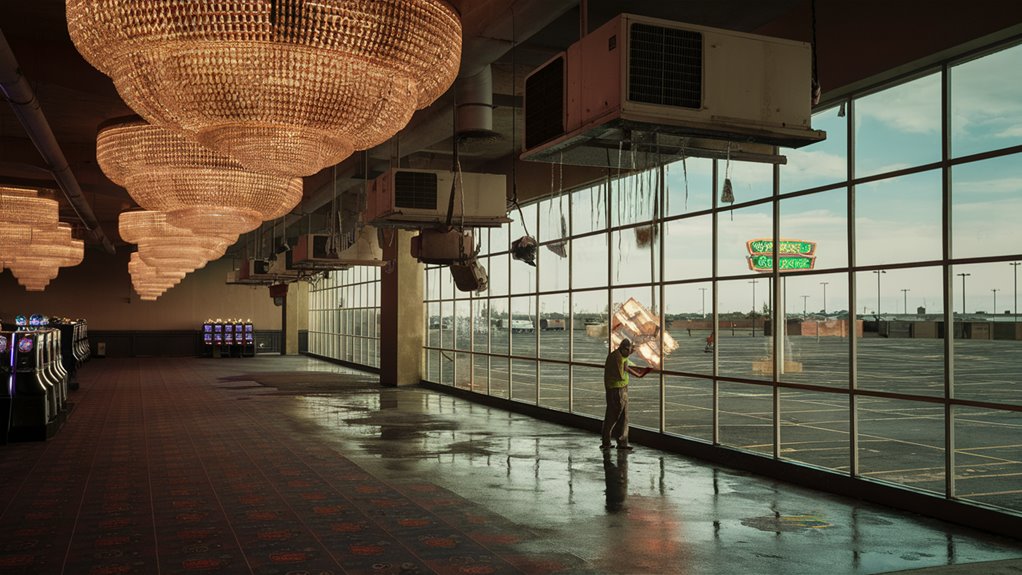
Let’s talk about something that often gets overlooked when we think about casino resorts – their huge environmental impact. You know those glossy brochures showing spectacular lights and fountains? Well, there’s a less glamorous side to the story.
Think about this: a single major casino resort uses enough electricity to power a small town. We’re talking about countless slot machines running non-stop, massive video displays lighting up the night sky, and elaborate water features operating around the clock.
Just imagine leaving every light and appliance in your house on for years – that’s the kind of energy consumption we’re dealing with here.
Speaking of water use, it’s pretty mind-boggling. These mega-resorts go through millions of gallons daily, which is especially concerning in places like Las Vegas where water is already scarce.
Between the hotel rooms, restaurants, swimming pools, and those iconic fountains, the water usage is off the charts. And don’t get me started on the waste.
Picture the trash generated by a small town, then compress that into one building – that’s what these resorts produce in food waste, packaging, and other materials every year.
The environmental impact starts even before the first guest checks in. Building these massive complexes often means clearing away native plants and animals from their natural habitats.
Local wildlife gets displaced, and those famous bright lights don’t just affect our view of the stars – they seriously disrupt natural animal behavior too.
Add in the constant stream of vehicles bringing guests to and from the resort, and you’ve got a recipe for significant air pollution and traffic congestion in the surrounding areas.
Regulatory Challenges in Physical Locations
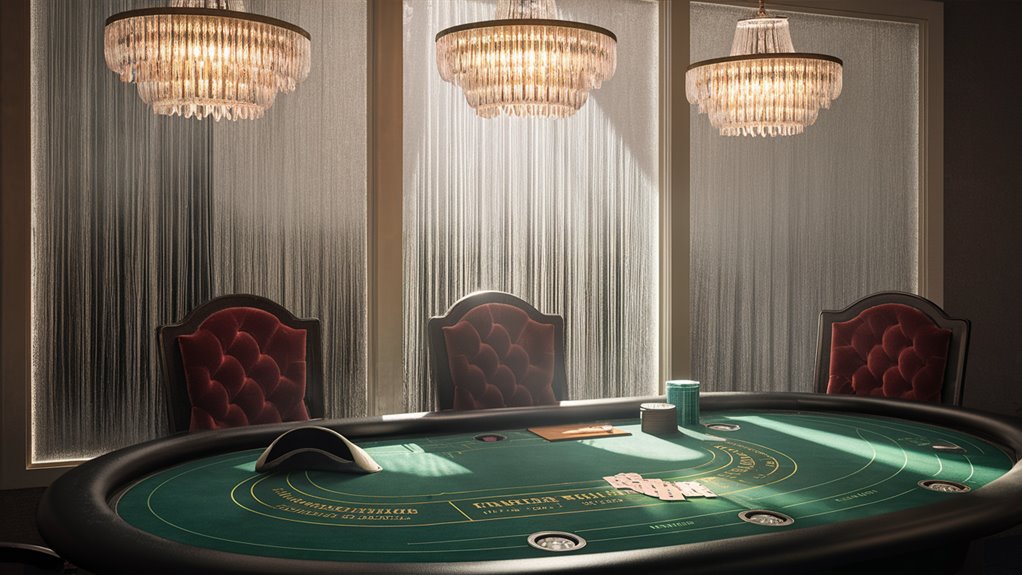
Let’s talk about what it really means to run a physical casino – trust me, it’s not just about dealing cards and collecting chips.
You know how every state seems to have its own rules about everything? Well, that goes double for casinos. What flies in Vegas might get you into hot water in Atlantic City.
Think of it like running a restaurant in multiple cities, but with about ten times more paperwork. You’ve got to keep track of countless documents, sit through regular audits (fun times!), and make sure every single employee has the right licenses.
And don’t even get me started on security protocols – they’re enough to make your head spin.
The financial side? Well, it’s not exactly pocket change we’re talking about. You’ll need deep pockets for those licensing fees, and the costs just keep piling up.
Remember how your bank asks questions when you make large deposits? Casinos deal with that on steroids. They need sophisticated systems to track suspicious transactions and keep everything above board.
One of the trickiest parts is staying on top of responsible gaming requirements. Your staff needs special training, and you have to maintain systems for people who want to exclude themselves from gambling.
It’s kind of like being a bouncer, accountant, and counselor all rolled into one.
The regulations just keep getting stricter, especially when it comes to handling money and protecting customers.
Running a casino these days is like trying to solve a puzzle where someone keeps changing the pieces – just when you think you’ve got it figured out, there’s a new rule to follow or system to implement.
And guess what? All of this affects your bottom line in ways that would make any business owner lose sleep.
Common Questions
How Long Does It Typically Take to Build a Large Casino Resort?
Building a large casino resort isn’t exactly a quick weekend project. You’re typically looking at about 18 to 36 months for the actual construction phase, but the whole process can stretch up to 5 years when you factor in everything else. Think about it – before the first shovel hits the ground, you need detailed designs, countless permits, and approvals from various authorities. Plus, let’s be honest, construction delays are pretty much part of the package with projects this big.
The timeline really depends on what you’re building. A luxury resort with multiple hotel towers, entertainment venues, and a massive gaming floor will naturally take longer than a more modest casino. And don’t forget about all those finishing touches – from installing sophisticated security systems to putting the final sparkle on those crystal chandeliers.
Weather, supply chain issues, and local regulations can throw some curveballs into your timeline too. It’s kind of like planning a huge wedding – you might have a target date in mind, but you need to build in some wiggle room for unexpected surprises along the way.
What Percentage of Casino Employees Transition to Online Gaming Industry Jobs?
Let’s talk about career transitions in the casino industry. You know how the gaming world is rapidly going digital? Well, interesting numbers are emerging about casino workers making the jump to online gaming jobs. While it’s tough to pin down exact figures, industry insiders suggest that around 15-20% of traditional casino employees successfully shift into digital gaming roles.
Think about it – for every 100 people working in brick-and-mortar casinos, roughly 15 to 20 of them end up finding their place in the online gaming sector. This transition isn’t always straightforward, though. Some roles, like digital marketing or customer support, tend to have smoother crossovers, while others might require additional training in new technologies.
Keep in mind that these numbers can vary quite a bit depending on factors like location, job type, and individual skill sets. Some casino workers adapt quickly to the digital environment, especially those who already have tech-savvy backgrounds or experience with gaming software. Others might need more time to build up the necessary digital skills, but the opportunities are definitely there for those willing to make the switch.
Do Physical Casinos Generate More Tax Revenue Than Online Gambling Platforms?
Let’s talk about casino tax revenue for a minute. You know how traditional brick-and-mortar casinos have always been the heavy hitters when it comes to generating tax dollars? Well, that’s still true today, but things are getting really interesting in the gambling world.
Physical casinos continue to bring in the bigger tax numbers overall, thanks to their full-service operations – think hotels, restaurants, entertainment venues, and those bustling gaming floors. But here’s where it gets interesting: online gambling platforms are gaining ground fast.
These digital platforms have some serious advantages working in their favor. They don’t need to maintain massive buildings or employ thousands of staff members, which means their overhead costs are way lower. Plus, they can reach players anywhere with an internet connection, whether they’re relaxing at home or commuting on the train.
Think of it like this: traditional casinos are like full-service resorts, while online platforms are more like the Netflix of gambling. Both have their place, but the digital world is definitely shaking things up. The tax revenue gap between the two is getting smaller each year, and some experts predict we might see a tipping point sooner than we think.
What’s really driving this shift? Convenience is king, and more people are comfortable betting from their phones or laptops. When you factor in the 24/7 accessibility and lower operating costs, it’s no wonder online platforms are becoming such strong contenders in the tax revenue game.
Which Casino Games Have the Highest Maintenance and Staffing Costs?
Let’s talk about casino staffing costs, because you might be surprised at which games really eat into a casino’s budget. When it comes to table games, baccarat, craps, and roulette are the real heavy hitters in terms of operational expenses. Think about it – these games need multiple skilled dealers working in shifts, plus eagle-eyed pit bosses keeping watch over the action. And that’s just the staffing side of things.
The equipment itself isn’t cheap either. Those precisely balanced roulette wheels need regular maintenance to stay perfectly calibrated, while craps tables require constant care to maintain their felt surfaces. Don’t even get me started on the cost of replacing worn-out chips, dice, and cards, which happens more often than you’d think.
You know how in movies you always see a crowd gathered around these games? Well, that’s exactly why casinos need so many staff members on hand. Between managing excited players, ensuring fair play, and handling large sums of money, these table games require constant attention and multiple pairs of trained eyes. It’s quite a different story from slot machines, which basically run themselves in comparison.
How Do Traditional Casinos Authenticate High-Value Casino Chips Across Different Locations?
Ever wonder how casinos keep track of their chips, especially when they’ve got multiple locations? Well, it’s actually pretty fascinating stuff. Think of casino chips as tiny high-tech gadgets these days – they’re way more sophisticated than those simple plastic tokens you might imagine.
Most big casinos now use what we call RFID technology in their chips. It’s kind of like having a tiny digital fingerprint inside each one. Pretty cool, right? When a chip hits the table, special sensors can instantly tell if it’s the real deal or not. Just like your phone can tap to pay at a store, these chips send out unique signals that verify they’re legitimate.
But that’s not all. Look closely at a casino chip under ultraviolet light, and you’ll spot special markings that are basically impossible to copy. Each chip also comes with its own serial number, kind of like a social security number for casino currency. And here’s the clever part – casinos share all this information through super-secure networks. So if someone tries to use a fake chip from one location at another, they’ll get caught pretty quickly.
The whole system is actually quite genius when you think about it. Casinos have basically created their own miniature banking system, complete with security features that would make Fort Knox jealous. Sure beats the old days when they had to eyeball each chip and hope for the best!
